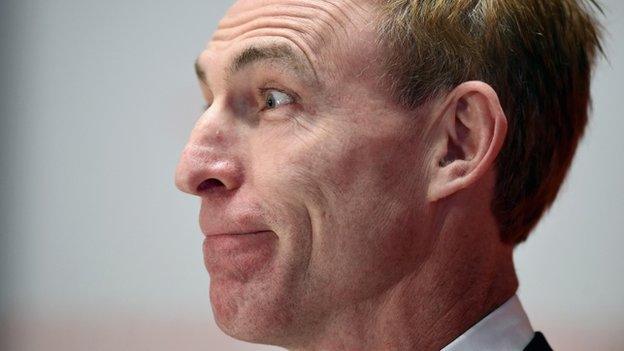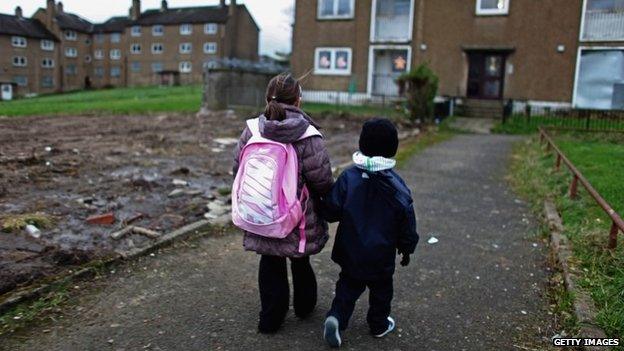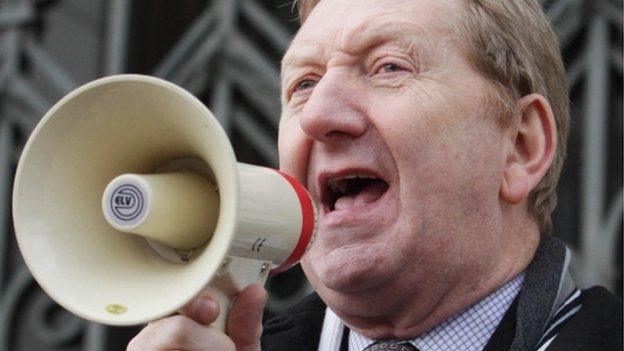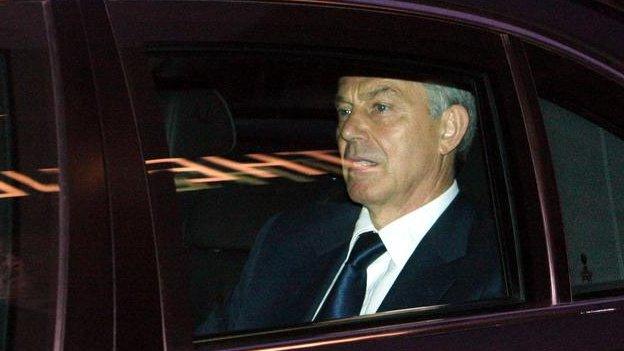Is Scottish Labour leader Jim Murphy about to bring back Blairism?
- Published

Jim Murphy has been elected to turn around Labour's fortunes in Scotland
I am agog in the Easterhouse Bridge theatre, transfixed by a simple tale.
The big, bad wolf huffs and puffs and the first little pig curls into a ball as her house of straw explodes in a crowd-pleasing burst of smoke and flames.
The kids love it. The adults love it. Let's face it - we all enjoy a vivid tale, well told.
Suddenly it is just possible Labour in Scotland has a story.
Whether the narrative works or fails could determine whether Ed Miliband becomes the UK's next prime minister. If he doesn't, there still might be lessons for the party.
I'm at the pantomime in Easterhouse, external to try to get a flavour of the mood towards the Labour party in Scotland after it elected its new leader, Jim Murphy.
This used to be the grim estate that every TV crew in the world went to when wanting to show grinding poverty and neglect.

In the next election will the Easterhouse area of Glasgow still be solidly Labour?
It is much improved now, but still working class to its foundation stone and, you'd think, classic Labour territory.
But it may be one of the places, external where the SNP could blow Labour's house down.
Just ask the audience. One woman tells me that she's always voted Labour but she'll switch to the SNP - they care more about local people, she says.
Many think this is a simple legacy of the referendum, and this is the main legacy Mr Murphy has to overcome.
Earlier in central Glasgow, one man tells me he is SNP because he's working class, and Labour aren't looking out for the people.
A woman says she used to be Labour but they don't care anymore.
If you don't trust me and these admittedly random encounters with my microphone, look at the polls.
Heartland under threat
Scotland has been Labour's redoubt, its heartland even in troubled times, one of the party's several birthplaces.
But now the party seems to be losing its grip on its heartland.

The SNP, now led by Nicola Sturgeon, is eyeing gains at Westminster
Stephen Fisher, a politics fellow at Trinity College, Oxford, says: "The polls for Labour in Scotland have been pretty bad.
"There have been four polls in October and November and they all showed a big swing from Labour to the SNP and on average it was about a 20% swing.
"In terms of seats, if there was a uniform swing across Scotland the SNP would win about 40 new seats, about 30 of which would be Labour."
Given that Labour currently has 41 Scottish MPs out its total of 257, external this sort of loss next May would be devastating for Ed Miliband.
As I sat in the hall tweeting about Murphy's victory someone tweeted back, "Does any normal human being care who is leader of Labour in Scotland?"
Well, any normal human being who is interested in the result of the general election perhaps should be interested.
Although it is, of course, theoretically possible for Labour to win without Scotland, in reality losing big north of the border would doom their chances of forming a majority government.
But too much focus on the referendum result could spell trouble.
Greater autonomy
The former Labour first minister Henry McLeish told me: "We've got to be far more autonomous in Scotland.
"The SNP have the benefit of not having to look over their shoulder to London. We must enjoy that same experience. Jim has to be tough on Westminster, tough on the UK Labour party."
I asked him if that was about policy, as well as mood.
"We are, unlike England, a progressive centre-left country. So Jim has got to embrace the issues of taxation, a living wage. There is a divergence between Scottish politics and English politics."
This is the fear of the left - that Murphy will offer English politics for the Scottish people and a return to the past.

Union leader Len McCluskey believes Murphy will be a disaster in Scotland
The (English) leader of the Unite union, Len McCluskey, warned, external: "He is the candidate of a reheated Blairism which in my view will be a sentence of political death for many Scottish Labour MPs, and for the prospect of a Labour victory next May."
I asked Murphy if he was a reheated Blairite. He has to deny the toxic charge.
"No, of course not. Tony Blair is part of Labour's tradition - part of our recent history that we should respect but not reheat.
"I am not interested in whether someone is left wing, right wing, new Labour or old Labour - I just want to end the recently acquired tag of 'losing Labour'."
Some assume that to regain the votes of the Scottish people Labour has to swing to the left. That is not Murphy's plan.
Already the narrative is pretty clear - he wants to make Scotland the "fairest society in the world".
But he also wants to welcome wealth creators. He constantly talks of patriotism.
He never misses an opportunity to stress he is independent of London to the point of bloody-mindedness: "I'm my own man, I'm going to do my own thing. I call the shots."
But he makes a very interesting point about the nature of Scotland.
Scottish solutions
"There are Scottish solutions but they are not necessarily left wing, they're certainly not right wing.
"I was up in Inverness the other day and all the way up that A9 there is lovely scenery and small towns - they are not big socialist cities - but the SNP win there."
He adds: "We believe in social justice, we believe in redistribution. But the most important policy in redistribution is a successful economy, more wealth, more entrepreneurs, so we can build the wealth we redistribute."
Does this smell a bit like reheated Blairism, perhaps with neeps on the side? At first that might seem deeply unattractive.
Who would want to stick into the microwave the tainted mess of personal and political fallibilities that have become associated with Labour's longest serving prime minister?
But good cooks know that many a dish improves for sitting for a while, allowing it to mature and mellow, before a gentle rechauffage.
You may think this sounds like lunacy. But the toxicity of Blairism lies less in the "ism" and more in the man.
After all, the point of Blairism, "New Labour" - or "The Project" as it was known back in the day - wasn't about foreign adventurism, vainglorious jet-setting or fratricide.

Support for the SNP is surging
In the eyes of his own party and its potential supporters Blair is tainted by three things.
Above all, there is Iraq - a war they and Britain did not want and which turned out to be based on a false premise and where swift victory was followed with excruciatingly empty-headed incompetence.
There are still those who will argue the toss, of course, but very few who would dream of voting Labour think Iraq was anything other than a disaster.
Then there is Tony Blair's one-man wealth creation project, with the occasional employer who raises eyebrows, external, which does not endear him to a party that is rediscovering its concerns about inequality.
He rather defensively joked the other day that he was worth "only" £10m - not the rumoured £20m or £30m, which makes Mary Antoinette look like a harried food bank volunteer.
Blairism will also be forever associated within the party with the terrible faction fighting that marred most of his time in office.
It is true Tony Blair himself bore only a slight responsibility for Gordon Brown's temper tantrums and brooding ambition.

For many Labour supporters, Tony Blair's reputation remains tainted
But Labour supporters hardly want to go back to a time when the ideologically identical Tweedle Dum and Tweedle Dee "agreed to have a battle" - when the personalities at the top of the party cleaved it into two armed camps devoid of any but the most subtle policy differences.
Thus Blair is a dirty word in Labour circles. Only David Cameron is happy to be seen as his political heir.
But TB's Project wasn't about these errors.
It was about making Labour electable. Ripping out the bits that offended, reaching so far beyond the no man's land of the centre ground that it fought deep into the enemy's territory - in those days "law and order" and defence. Oh, and economic competence.
Of course this was about policy, of course it moved Labour to the right. But at heart it was more a strategy than an ideology - an attempt to reach parts of the electorate who never thought of themselves as Labour.
Perhaps this is the reverse of what Labour has to achieve in Scotland - in part winning back the old working class vote.
Indeed in the UK as a whole you could argue that Labour's problems are a legacy of Blair's indifference to old socialist values that has helped destroy tribalism and the allegiance of the party's core vote.
House of bricks
But I don't think Jim Murphy would agree.
He wants those small business people who may be tempted by the SNP to see Labour as a more natural home.
He is unlikely to allow sentiment about the past to get in the way.
In the pantomime, the geeky, bookish other worldly pig constructing a house of sticks, learns from the provident pig who builds a tried and tested house of bricks and mortar, sheltering inside when everything comes crashing down.
Mr Murphy has only a few months to act out his story - but those Labour supporters in the rest of the UK who understand the rules of narrative will be watching with interest.